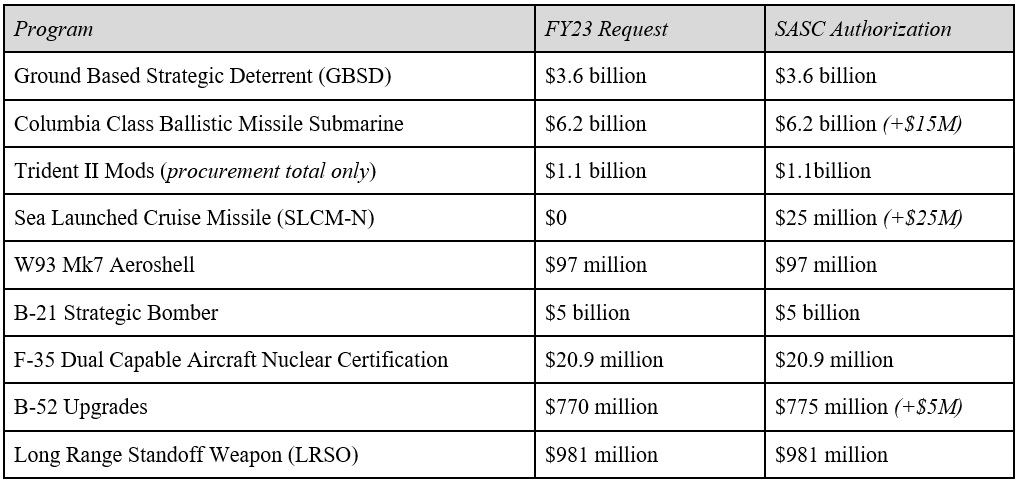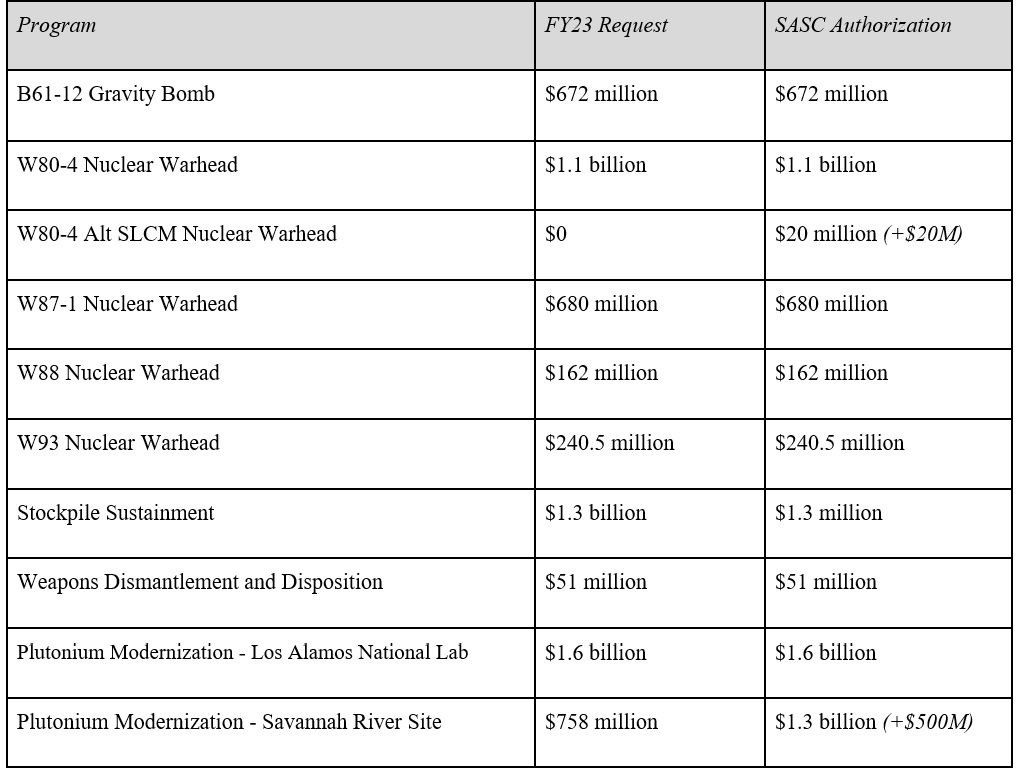as passed by the Senate Armed Services Committee
- Table numbers in parentheses are increases or decreases from the FY23 Request
- FY23 requested levels come from the Center for Arms Control and Non-Proliferation’s Fiscal Year 2023 Defense Budget Request Briefing Book
- Numbers may not add due to rounding
Total National Defense Discretionary Spending Authorization (050)

*Does not include mandatory spending
**Total increase from FY22 enacted topline is $75.6 billion, or 9.7%.
DOD Nuclear Weapons Funding Authorization for Select Programs
National Nuclear Security Administration (NNSA) Funding Authorization
DOE Nuclear Weapons Funding Authorization for Select Programs
Select Provisions Related to Nuclear Weapons
➤ Nuclear Weapons Council: Requires the Nuclear Weapons Council (NWC) to notify Congress within 30 days of a DOE budget request whether the request is adequate and requires notification if an authorization or appropriations bill enacted by Congress delays delivery or certification of a nuclear weapons system currently in development (Sec. 1511)
➤ DOD/NNSA/NWC Joint Risk Management Process: Requires the establishment of a joint risk management framework to periodically identify, analyze, and respond to risks that affect the nuclear enterprise of the United States (Sec. 1512)
➤ Nuclear Weapons Briefing: Requires a biannual briefing to HASC and SASC on nuclear matters from various DOD and NNSA officials (Sec. 1513)
➤ US-UK Nuclear Cooperation: Expresses the sense of the Senate about the value of the U.S., U.K. and French nuclear deterrents for NATO and that continued nuclear cooperation will help both the U.S. and U.K. modernize more effectively (Sec. 1517)
➤ ICBM Reports: Limits funds authorized for the Under Secretary of Defense for Policy to 50% until any 2021 or 2022 reports contracted by the federal government regarding a Minuteman III service life extension or the future of the ICBM force are submitted to Congress (Sec. 1518)
➤ Deployed ICBMs: Bars reducing the number of deployed intercontinental ballistic missiles below 400 (Sec. 1519)
➤ Hard & Deeply Buried Targets: Prohibits dismantling the B83-1 until a report on the defeat of hard and deeply buried targets is provided to Congress (Sec. 1520)
➤ LEU limitation: Limits the use of funds for LEU naval fuel systems until a report on the validity of such a system and whether it would decrease vehicle capacity or increase cost is provided to Congress (Sec. 1521)
➤ SLCM-N Alternatives Report: Limits funds authorized for the Under Secretary of Defense for Policy to 75% until the analysis of alternatives for the nuclear sea-launched cruise missile is released and briefed on to Congress, as required by the 2022 NDAA (Sec. 1522)
➤ Plutonium Pit Production Capacity Plan: Limits funds for the Under Secretary of Defense for Acquisition and Sustainment to no more than 75% until the Chairman of the Nuclear Weapons Council submits a plan to Congress to enable the nuclear security enterprise to meet pit production requirements (Sec. 1524)
➤ Plutonium Pit Production Annual Certification and Reporting: Strikes existing reporting and briefing requirements related to plutonium pit production and extends the annual certification that the NNSA’s plan is on track to meet 80 pits per year by 2030 (Secs. 1528-1529)
Missile Defeat and Defense Funding Authorization for Select Programs
Select Provisions Related to Missile Defense
➤ BMD Cyber Operations: Directs the Director of the Missile Defense Agency to develop a plan to conduct persistent cybersecurity operations across all networks and systems supporting the Ballistic Missile Defense System (Sec 1541)
➤ Middle East Integrated Air and Missile Defense: Requires the Secretary of Defense to undertake a strategy for improved integrated air and missile defense cooperation between the United States and certain Middle Eastern allies and partners to counter threats from Iran and Iranian-linked groups and requires a cost feasibility study to achieve such progress (Sec. 1542)
➤ Designation of Individual Responsible for Guam Missile Defense: Requires the Secretary of Defense to designate a senior Department of Defense official to be responsible for Guam missile defense (Sec. 1543)
➤ NGI Funding Plan: Requires the Secretary of Defense to submit a plan on the acquisition of no fewer than 64 Next Generation Interceptors (NGI), the latest Pentagon attempt to develop a missile defense interceptor that works, with the 2024 budget request and requires a report at least 90 days before any decision to cancel the NGI program (Sec. 1544)
➤ Biannual Missile Defense Briefing: Requires biannual missile defense briefings to HASC and SASC each year by certain DOD, MDA, and Joint Staff officials (Sec. 1545)
➤ Israeli Missile Defense Program Co-Development and Co-Production: Authorizes up to $80 million for the Iron Dome short-range rocket defense system, $40 million for the David’s Sling Weapon System, and $80 million for the Arrow 3 Upper Tier Interceptor Program (Sec. 1547)
Miscellaneous Programs & Provisions of Interest
➤ Pay Raise: Authorizes a 4.6% pay raise for service members and civilians.
➤ CTR Funds: Authorizes $342 million, the requested level, for the Defense Cooperative Threat Reduction Program (Sec. 1301)
➤ Assessment of Iran Sanctions Relief on Terrorist Activities under JCPOA: Requires the Director of the Defense Intelligence Agency and the Commander of U.S. Central Command to brief Congress on the extent to which they believe Iran would use sanctions relief to bolster its support for Iranian-linked groups and how U.S. Central Command might deter and counter increased malign behavior from such groups (Report Language)
Final Passage
The bill was reported favorably out of committee by a 23-3 vote.
The bill is expected to come to the Senate floor for amendment consideration and final passage in the November lame duck session.





